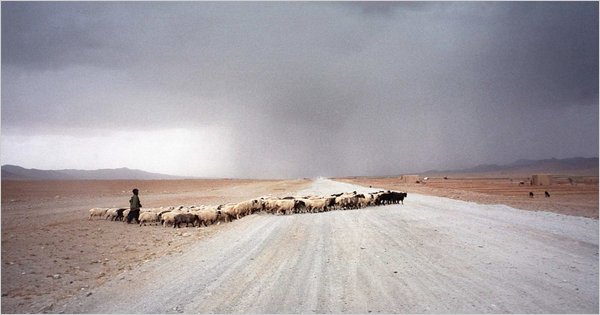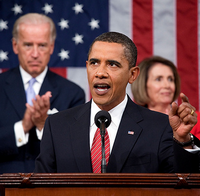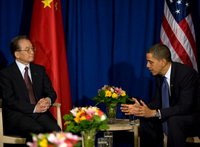 Beneath the sheep be lithium
Beneath the sheep be lithium
NYT story via Michael Smith and David Damast and HuskerInLA.
I know the temptation for crowing here is intense, but I would suggest going very easy on the cascading assumptions. There are a lot of reasons why this news has remained unknown this deep into globalization's expansion.
The "shocker" here is that U.S. geologists have confirmed what has been long suspected: Afghanistan's mineral riches are significant. Just like with Iraq, once outside experts got some free range, a lot more reserves were found. Frankly, that'd be true for any Gap nation that's remained largely cut-off from the outside world for reasons of too much dictatorship or not enough law. Hell, it was true for Russia on oil.
This is being presented as a game-changer, but I think the overselling is premature.
First off, understand that the mining world doesn't exactly get turned upside down on this basis. This is great news and potentially game-changing for Afghanistan if a lot of things go right--for a long time, but it will not alter any larger realities in the global marketplace (where China is the demand center of the global mining industry), except to end this nonsense notion that somehow Bolivia controls the bulk of the world's lithium (Whew! Dodged that would-be superpower!). There is lithium being found in plenty of places, trust me. The same discounting can now be applied to China's alleged cornering of the entire rare earth market--also a vastly oversold fear.
Mineral riches in the range of $1T certainly shove Afghanistan into the big-boy category (past estimates said Afghanistan was Syria-sized in oil and had just enough minerals to qualify as resource-cursed--a line I've used to very ho-hum effect in the brief for two years now, suggesting that no American audience I've ever come across would suddenly jump and say, "Yeah baby, this changes everything!") , but the primary reason why the place has never been sufficiently checked out before now has been the security situation/lack of governance, and that doesn't exactly change overnight on the basis of this information. Nor will it change--I suspect--the Obama administration's unwillingness to sign up for a significant combat presence that drags into the next election at anywhere near the level to maintain enough security to get balls seriously rolling. "Blood for lithium" doesn't exactly ring the average American citizen's bell. It also won't likely make the Taliban any less fierce in their fighting--anything but. If you don't believe me, then please remember that the Naxalite Maoists in India do best in areas where mining deals strikes the local as inequitable.
Most importantly (and this is what Enterra learned in our Development-in-a-Box work in Kurdish Iraq), the discovery doesn't change but only reveals the lack of counterparty capacity in Afghanistan--as in, plenty of outside parties willing to engage in the transaction, but Afghanistan's government is nowhere near capable of playing the counterparty. And yeah, it takes two to tango. Remember the first thing Jed Clampett did after he moved to Beverly Hills: he got himself a Mr. Drysdale. There will be a lot of entities vying for that role in Afghanistan, and in many ways, it would be better if that role wasn't hogged by the Americans.
Finally, don't assume any of this is a big surprise to the Chinese, whose overly-generous 30-year deal on the Anyak copper mine now looks like the start of a beautiful and logically far larger relationship. China, after all, has a border with Afghanistan (76 clicks long); we don't. The basic pattern long cited here of Americans doing the Leviathan heavy-lifting while the Chinese reap the SysAdmin winnings isn't exactly snapped by this news--anything but.
So as before, I think the key remains getting a whole lot more rising great powers deeply--and I mean DEEPLY--interested in helping secure Afghanistan for the long haul. Mining isn't a slam-dunk but years upon years upon years of stability required for the riches to flow, and then they have to flow with some transparency and positive popular impact, otherwise you can find yourself in an endemic conflict situation that's just Afghanistan-the-failed-state-as-we've-known-it now supercharged by a fungible source of funding for any side willing to kill enough to control its resulting wealth.
Before anybody gets the idea that somehow the West is the winner here, understand that we're not the big draw on most of these minerals--that would be Asia and China in particular. What no one should expect is that the discovery suddenly makes it imperative that NATO do whatever it takes to stay and win and somehow control the mineral outcomes, because--again--that's now how it works in most Gap situations like Africa. We can talk all we want about China not "dominating" the situation, but their demand will drive the process either directly or indirectly. There is no one in the world of mining that's looking to make an enemy out of China over this, and one way or another, most of this stuff ends up going East--not West.
If anything, this news should be used to leverage more of a security contribution out of regional great powers--to include China. So less of a game changer than perhaps a very welcome game accelerator--as in, China is a lot better positioned to reap the mineral rewards that is Afghanistan, with the question being, "How long does it take for China to step up security-wise and stop low-balling its effort there?" Certainly, the notion that we turn Afghanistan and all its minerals over to Karzai's cronies, Pakistan's ISI and the Taliban strikes me as truly cracked, but the truth remains: we and our Western allies aren't enough to make the security situation happen on our own--not for the long timelines required. If it were that easy, these discoveries would have been made decades ago.
I'm not trying to diminish the importance of the findings here (although, again, whenever an isolated place like this finally gets checked over, the "stunning" surprise is the same--as in, there's lots more than anybody knew previously); I'm just saying the macro dynamics aren't all that altered.
So again, less a game-changer than potentially a tremendous game-accelerator. China is now that much more incentivized to accelerate its penetration, and it would be nice to see that happen on a timetable that helps us while effectively drawing Beijing into more explicit partnership.
Or we can pretend this is going to remain a NATO-dominated show that somehow achieves Afghanistan's potential as a long-term supplier of important minerals to the global economy.
If I've said once in the brief, I've said it a thousand times (literally!): Americans cannot integrate a nation-state on the other side of the planet into the global economy all on our own. Our Leviathan can rule any battlespace, but the SysAdmin's victory is necessarily a multilateral one.
Here's the simplest reality test I can offer you: if we're just at the initial discovery phase now, we're talking upwards of a decade before there will be mature mines. Fast-forward a decade in your mind and try to imagine the US having a bigger presence in Afghanistan than China. I myself cannot.
Start with that realization and move backward, because exploring any other pathway will likely expose you to a whole lotta hype.
 Tuesday, June 15, 2010 at 12:06AM
Tuesday, June 15, 2010 at 12:06AM  WPR piece by Miles E. Taylor that does the usual word count, but does it well.
WPR piece by Miles E. Taylor that does the usual word count, but does it well.





























